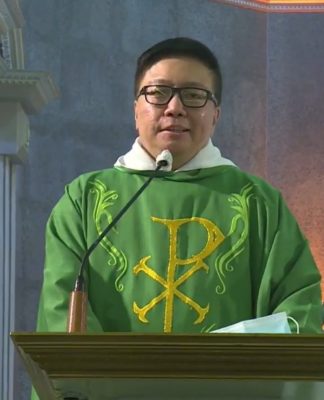THE CATHOLIC Bishops’ Conference of the Philippines (CBCP) has stood firm on the Church’s consistent opposition to same-sex marriage amid growing clamor among homosexuals to be given the “right” to a “holy union.”
In a pastoral letter titled “The Dignity and Vocation of Homosexual Persons,” Lingayen-Dagupan Archbishop Socrates Villegas, CBCP president, reiterated that same-sex marriage could not happen because, aside from a loving relationship, holy union requires procreation, which is exclusive to male and female couples.
“As it is ordered or directed to the union of man and woman, human sexuality is also ordered towards the procreation and education of children. It is in and through the conjugal union that God has willed to give man and woman a share in His work of creation,” Villegas said in the letter released last Aug. 28.
Villegas said granting homosexual couples the right to marriage would be an injustice as they would not be able to contribute to procreation. “They are not able to contribute in a proper way to the procreation and survival of the human race, and thus it would be an injustice to grant them legal recognition along with the same benefits and privileges accorded to marriage,” Villegas said.
Villegas, however, clarified that homosexual attraction is not a sin.
The Catechism of the Catholic Church states that the Church is not against “homosexual people” but homosexual acts. According to the Catechism, homosexual people must be accepted with respect, compassion, and sensitivity.
Bishop Broderick Pabillo, auxiliary bishop of Manila, said the ability to procreate and openness to creating life are paramount in the institution of marriage.
“Sa natural law, ang pamilya naman talaga ay babae’t lalaki. Ano ba ang purpose ng marriage? Openness to life and procreation,” Pabillo told the Varsitarian. “With the love of the family and the married couple, is the love that is open to life. Hindi naman mangyayari ‘yan sa homosexual unions,” Pabillo said.
Anthony Perez, president of the group Filipinos for Life, said the Church would continue to oppose same-sex marriage because its role is to “teach the truth.”
“Tungkulin ng Simbahan [na] ituro ang katotohanan, kaya lalabanan ito ng Simbahan. Hindi siya makakapayag na ibahin ng tao ang tunay na diwa ng kasal,” Perez said.
US Supreme Court ruling
The CBCP pastoral letter came on the heels of the June 26 US Supreme Court decision making same-sex marriage legal in all 50 states in the US.
The ruling, penned by Justice Anthony Kennedy was widely praised for upholding a concept of marriage that embodies “love that may endure even past death,” but was also roundly criticized for short-circuiting the democratic and legislative processes.
Previously, it was up to each state to legalize same-sex marriages under the US federal system of government, which divides powers between the federal and state governments.
Chief Justice John Roberts wrote a vigorous dissent, as did the three others in the minority. Roberts said the majority created a right not found in the US Constitution and past rulings, and closed the debate instead of leaving the matter to state governments.
He wrote: “The majority’s decision is an act of will, not legal judgment. The right it announces has no basis in the Constitution or this Court’s precedent. …The Court invalidates the marriage laws of more than half the States and orders the transformation of a social institution that has formed the basis of human society for millennia, for the Kalahari Bushmen and the Han Chinese, the Carthaginians and the Aztecs. Just who do we think we are?”
Local efforts begin
In the Philippines, proponents of same-sex marriage are taking their cue from their successful US counterparts.
Last May 18, lawyer Jesus Nicardo Falcis III petitioned the Supreme Court to give the “Lesbian, Gay, Bisexual, Transgender” (LGBT) community in the Philippines equal protection of the law and the right to marriage. The petition aims to nullify parts of the Family Code or Executive Order No. 209.
Members of the LGBTS Christian Church Inc., an independent church that describes itself as “Protestant,” attempted but failed to apply for a marriage license in the Quezon City Registrar’s Office last Aug. 3.
Rev. Ceejay Agbayani, founding pastor of the LGBTS Christian Church, argued that procreation should not be the basis of marriage. “Mutual love, respect, and support [is] the essence of marriage. Walang procreation doon,” Agbayani told the Varsitarian in an interview.
‘Impossible’
But lawyer Jeremy Gatdula, professor of law at the University of Asia and the Pacific, said legalizing same-sex marriage under the 1987 Constitution was impossible, as the charter adheres to the traditional context of marriage.
“Marriage in [the Philippine] constitution is always within the context of the family and of the raising of children,” Gatdula told the Varsitarian. “In order for same-sex marriage to happen in the Philippines, there will have to be an amendment of the Constitution. But as it stands now, marriage is safe given the traditional definition of marriage.”
The state’s interest in marriage is clearly linked to its procreative purpose, he added.
“Why should the state have any reason to actually be involved in the relationship of two people just because they’re in love?” Gatdula asked. “Under the traditional marriage institution, the interest of the state is clear. It is because of the fact that the family is taking care of the future citizens of the state.”
Article XV, Section 2 of the 1987 Constitution states that “Marriage, as an inviolable social institution, is the foundation of the family and shall be protected by the State.” Section 3 states that “The State shall defend: (1) The right of spouses to found a family in accordance with their religious convictions and the demands of responsible parenthood.”
The Family Code defines marriage as “a special contract of permanent union between a man and a woman entered into in accordance with law for the establishment of conjugal and family life.”















